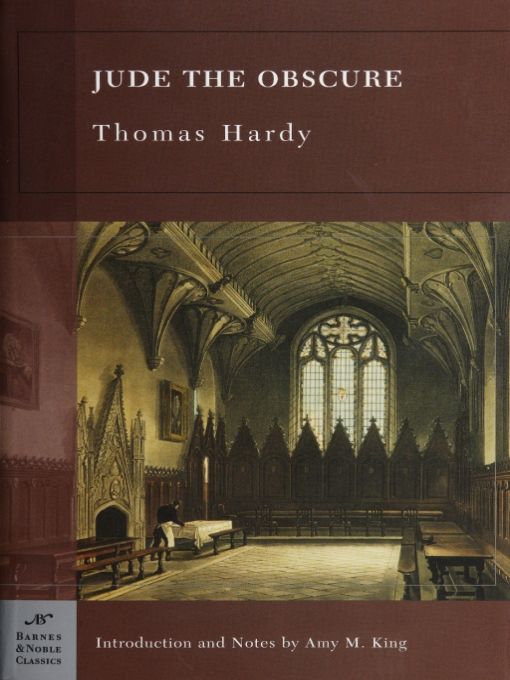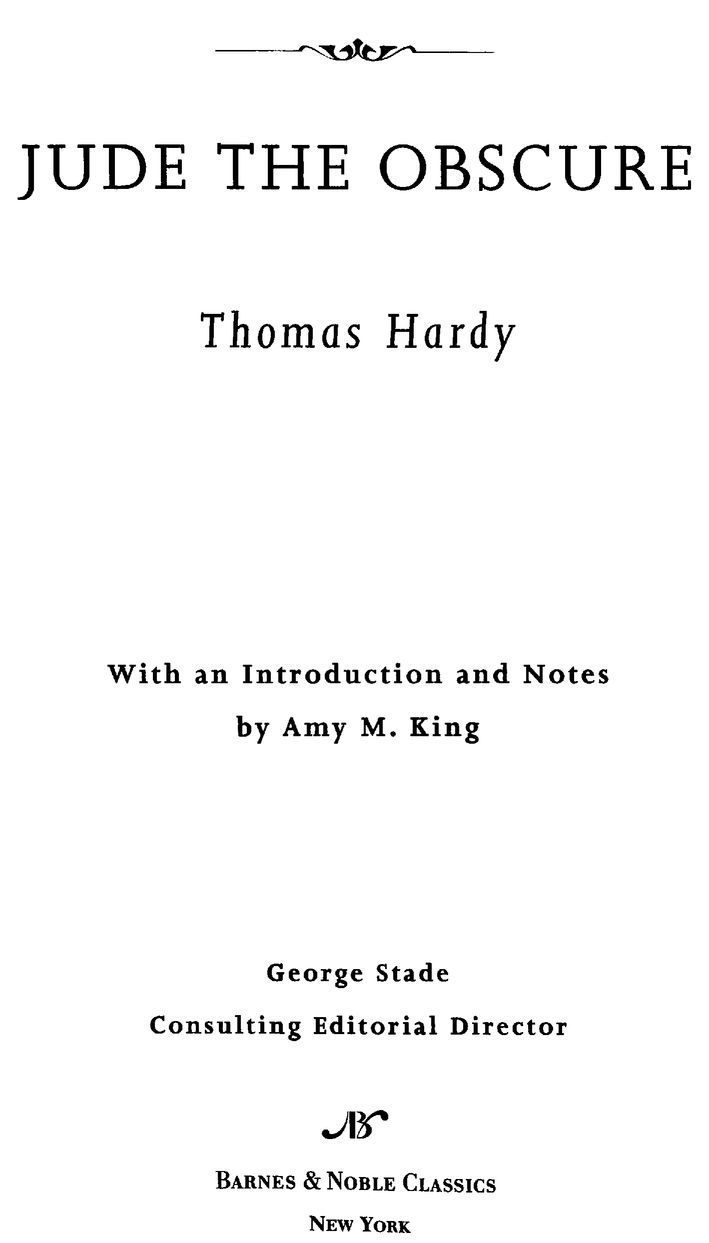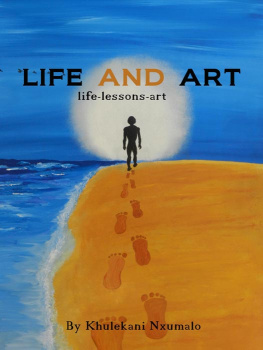
Table of Contents
FROM THE PAGES OF
JUDE THE OBSCURE
You know what a university is, and a university degree? It is the necessary hall-mark of a man who wants to do anything in teaching.
(page 10)
Somebody might have come along that way who would have asked him his trouble, and might have cheered him by saying that his notions were further advanced than those of his grammarian. But nobody did come, because nobody does; and under the crushing recognition of his gigantic error Jude continued to wish himself out of the world. (page 31)
Jude Fawley shouldered his tool-basket and resumed his lonely way, filled with an ardour at which he mentally stood at gaze. He had just inhaled a single breath from a new atmosphere, which had evidently been hanging round him everywhere he went, for he knew not how long, but had somehow been divided from his actual breathing as by a sheet of glass. The intentions as to reading, working, and learning, which he had so precisely formulated only a few minutes earlier, were suffering a curious collapse into a corner, he knew not how.
(page 42)
Their lives were ruined, he thought; ruined by the fundamental error of their matrimonial union: that of having based a permanent contract on a temporary feeling which had no necessary connection with affinities that alone render a life-long comradeship tolerable.
(page 71)
Weary and mud-bespattered, but quite possessed of his ordinary clearness of brain, he sat down by the well, thinking as he did so what a poor Christ he made. (page 128)
She looked into his eyes with her own tearful ones, and her lips suddenly parted as if she were going to avow something. But she went on; and whatever she had meant to say remained unspoken. (page 180)
He knew he should go to see her again, according to her invitation. Those earnest men he read of, the saints, whom Sue, with gentle irreverence, called his demi-gods, would have shunned such encounters if they doubted their own strength. But he could not. He might fast and pray during the whole interval, but the human was more powerful in him than the Divine. (page 213)
Sometimes a womans love of being loved gets the better of her conscience, and though she is agonized at the thought of treating a man cruelly, she encourages him to love her while she doesnt love him at all. (page 248)
All laughing comes from misapprehension. Rightly looked at there is no laughable thing under the sun. (page 2 8 2)
His hope that he was recovering proved so far well grounded that in three weeks they had arrived in the city of many memories; were actually treading its pavements, receiving the reflection of the sunshine from its wasting walls. (page 327)
Do not do an immoral thing for moral reasons! (page 362)
The best and greatest among mankind are those who do themselves no worldly good. Every successful man is more or less a selfish man. The devoted fail. (page 370)

THOMAS HARDY
Thomas Hardy was born on June 2, 1840, in the village of Higher Bockhampton, near Dorchester, a market town in the county of Dorset. Hardy would spend much of his life in his native region, transforming its rural landscapes into his fictional Wessex. Hardys mother, Jemima, inspired him with a taste for literature, while his stonemason father, Thomas, shared with him a love of architecture and music (the two played the fiddle in the parish choir and at local dances). As a boy Hardy read widely in the popular fiction of the day including the novels of Scott, Dumas, Dickens, W Harrison Ainsworth, and G. P. R. James, and in the poetry of Scott, Wordsworth, Byron, Shelley, Keats, and others. Strongly influenced by the Bible and the liturgy of the Anglican Church in his youth, Hardy later contemplated a career in the ministry; but his assimilation of the new theories of Darwinian evolutionism eventually made him an agnostic and a severe critic of the limitations of traditional religion.
Although Hardy was a gifted student at the local schools he attended as a boy for eight years, his lower-class social origins limited his further educational opportunities. At sixteen he was apprenticed to the architect James Hicks in Dorchester and began an architectural career primarily focused on the restoration of churches. In Dorchester Hardy was also befriended by Horace Moule, eight years Hardys senior, who acted as an intellectual mentor and literary advisor throughout his youth and early adulthood. From 1862 to 1867 Hardy worked in London for the distinguished architect Arthur Blomfield, but he continued to studyliterature, art, philosophy, science, history, the classicsand to write, first poetry and then fiction.
By the early 1870s Hardys first two published novels, Desperate Remedies and Under the Greenwood Tree, appeared to little acclaim or sales. With his third novel, A Pair of Blue Eyes, he began the practice of serializing his fiction in magazines prior to book publication, a method that he would utilize throughout his career as a novelist. In 1874, the year of his marriage to Emma Gifford of St. Juliot, Cornwall, Hardy enjoyed his first significant commercial and critical success with the book publication of Far from the Madding Crowd after its serialization in the Cornhill Magazine. Hardy and his wife lived in several locations in London, Dorset, and Somerset before settling in southwest London for three years in 1878. During the late 1870s and early 1880s Hardy published The Return of the Native, The Trumpet-Major, A Laodicean, and Two on a Tower while consolidating his place as a leading contemporary English novelist. He would also eventually produce four volumes of short stories: Wessex Tales, A Group of Noble Dames, Lifes Little Ironies, and A Changed Man and Other Tales.
In 1883 Hardy and his wife moved back to Dorchester where Hardy wrote The Mayor of Casterbridge, set in a fictionalized version of Dorchester, and went on to design and construct a permanent home for himself, named Max Gate, completed in 1885. In the later 1880s and early 1890s Hardy wrote three of his greatest novels, The Woodlanders, Tess of the dUrbervilles, and Jude the Obscure, all of them notable for their remarkable tragic power. The latter two novels were both initially published as magazine serials in which potentially objectionable moral and religious content was removed by the author, only to be restored in book publication; both novels nevertheless aroused public controversy for their criticisms of Victorian sexual and religious mores. The appearance of Jude the Obscure in 1895 in particular precipitated harsh attacks on Hardys alleged pessimism and immorality, contributing to his decision to abandon the writing of fiction after the appearance of his last-published novel, The Well-Beloved.
In the later 1890s Hardy returned to the writing of poetry that he had abandoned for fiction thirty years earlier. Wessex Poems appeared in 1898, followed by several volumes of poetry at regular intervals over the next three decades. Between 1904 and 1908 Hardy published a three-part epic verse drama, The Dynasts, based on the Napoleonic Wars of the early nineteenth century. Following the death of his first wife in 1912 Hardy married his literary secretary Florence Dugdale in 1914. Receiving a variety of public honors in the last two decades of his life, Hardy continued to publish poems until his death at Max Gate on January 11, 1928. His ashes were interred in the Poets Corner of Westminster Abbey in London and his heart in Stinsford outside Dorchester. Regarded as one of Englands greatest authors in both fiction and poetry, Hardy has inspired such notable twentieth-century writers as Marcel Proust, John Cowper Powys, D. H. Lawrence, Theodore Dreiser, and John Fowles.
Next page






